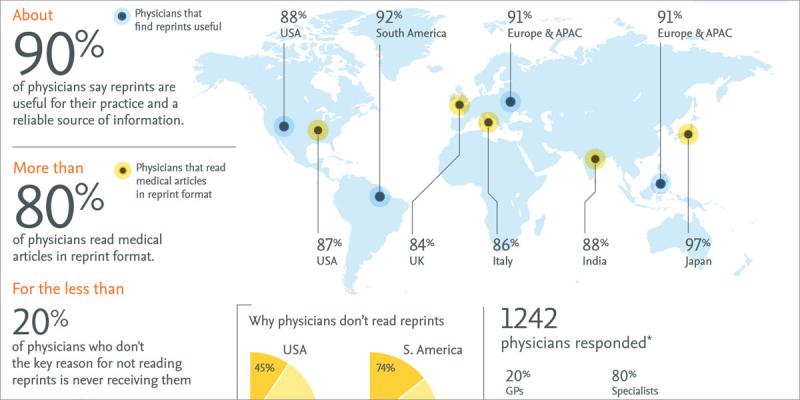
Article
How reprints can help doctors improve patient care - with infographic
For doctors, getting patient care right can be a case of life or death. They need to stay up to date with the latest research in their field, but that takes time – something that’s in short supply. It would seem logical, then, that doctors would welcome relevant and important medical studies in their inboxes, which they could use when diagnosing and treating patients.
With this in mind, pharmaceutical companies often sponsor and distribute reprints – republished versions of medical studies that doctors can use in their work, which are emailed to them for free.
Elsevier recently carried out a global survey of physicians to find out whether doctors find these reprints useful, and to what extent reprints impact their work with patients. Carried out in December 2018 and January 2019, the survey asked physicians to share their experience using reprints.
The aim of the research was to understand how primary care physicians and specialists access and use scientific articles in reprint format, and why they choose certain content. The responses provided global insights across care areas: 1,242 physicians from Europe, the United States, Asia Pacific and Latin America responded; about 80 percent were medical specialists and 20 percent were general practitioners.
90 percent say reprints are useful and reliable
Almost all of the respondents – about 90 percent – said reprints are useful for their practice and a reliable source of information. This was fairly steady geographically, ranging from 88 percent in the US to 92 percent in Latin America.
According to Dr. Ron Allison, Director of Radiation Oncology at the Federal Medical Center in Butner North Carolina, reprints are indispensable:
"As a practicing oncologist, I find article reprints to be of critical importance. When I am developing state-of-the-art cancer care for an individual patient, I require up-to-date knowledge of the latest trends and clinical outcomes for very specific cancers of very specific stage. To obtain this specific information, reprints are crucial."
He’s not alone: 87 percent of the US physicians who responded said they read medical articles in reprint format. Worldwide, more than 80 percent of respondents agreed. Dr. Rosa Girón of Hospital Universitario de la Princesa in Madrid wrote: “It is impossible to work without reading reprints as medical advances progress quickly, and it is mandatory to know (about) them to apply them in the usual medical practices.”
Doctors spend 1 to 2 hours a day looking for information online
In Spain, where Dr. Girón cares for patients with cystic fibrosis, 44 percent of the physicians who responded to the survey use medical information websites like PracticeUpdate and Medscape; the proportion globally is slightly lower at one-third.
Doctors also spend time looking for reprints so they can access the latest medical advances. On average, they spend 1 to 2 hours a day online searching for medical information. Their top source of reprints is online medical platforms, with up to 67 percent of physicians searching for reprints daily or weekly.
This is time well invested, according to Dr. Allison, who said he needs the full background of a study to inform his decisions.
“While abstracts and summary articles can assist, the needed finely detailed information concerning a particular cancer diagnosis, treatment and outcome can usually only be found in the primary article,” he explained. “Having a reprint of the article allows me to review these findings in great detail and at my own pace.”
Physicians look for a range of content in reprint format, according to the survey results. Guidelines, article reviews and chapters from medical books are the most popular, with journal articles and clinical trials considered important sources of clinical research information and to support them in prescribing drugs.
Dr. Girón explained: “It is important, given the amount of information published, to select meta-analysis articles, multicenter observational studies and clinical trials. You can apply the diagnostic and therapeutic novelties in patients. I dedicate a large part of my time to cystic fibrosis, which is a rare and deadly disease, with around 75,000 patients worldwide; it is necessary to read reprints to apply the latest therapeutic advances to my patients as far as possible.”
An untapped opportunity
Reprints also come to the doctors: about three-quarters of the physicians who responded to the survey receive at least three reprints every month, and they’re mostly electronic. These come from pharma companies: up to 45 percent of the respondents said they receive reprints from pharma marketing communications, with the biggest sources being Novartis, Pfizer, AstraZeneca and GlaxoSmithKline.
However, this isn’t the case everywhere: three in 10 physicians in the US, UK, Australia and New Zealand never receive reprints from pharma companies. With up to 32 percent of physicians ranking this source in their top three, this suggests an opportunity to reach more doctors with medical information in the form of reprints.
By sponsoring content in the form of reprints, companies are supporting their audiences with information they can use – and share. Dr. Allison said:
“On many occasions, I share reprints with my patient and their caregivers so they can make far more informed and realistic decisions about treatment options.”
“Reprints of high-quality studies also serve as an excellent tool for teaching and to maintain up-to-date information for participants of multidisciplinary tumor boards, where different specialists gather to discuss and implement care,” he added. “Using a reprint for group discussion often yields a higher level of knowledge on a topic for everyone involved.”
Download the full infographic - a global survey of physicians shows that reprints of medical articles are an important source of information.


